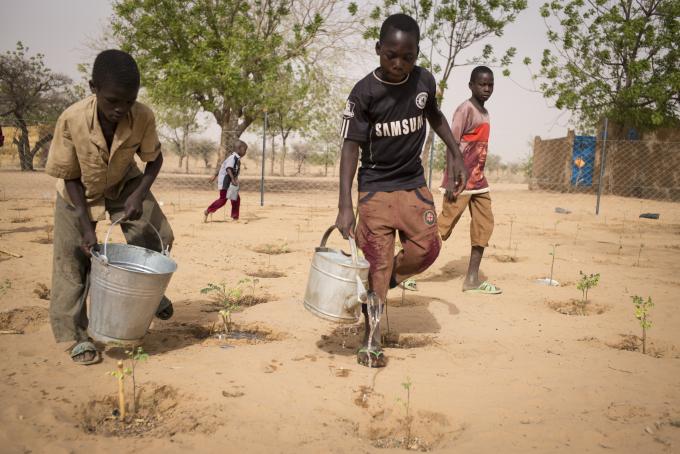Child poverty

OVERVIEW OF THE THEME
The food situation in Niger remains worrying because every second year there is a deficit and each deficit causes a deterioration in household livelihoods. Households are slowly becoming poorer and this is compounded by the context of armed conflict and climate change which is causing a humanitarian crisis in most of our areas. Populations are experiencing disastrous consequences affecting their daily resilience. The year 2021 was no exception to the rule, and was one of the worst years Niger has experienced in the last five years. It is characterised by rising food prices, a huge agricultural deficit and insecurity that is undermining the efforts of rural communities to reduce deficits.
THE THEME AT SAVE THE CHILDREN
The Early Warning System Coordination Unit, with technical and/or financial support from Save the Children and its partners, has made quality data available to decision makers. A technical HEA group was created to involve other partners, such as UN agencies (WFP, FAO and UNDP) and regional and national food security actors such as FEWSNET and international NGOs (OXFAM, ACF, CONCERN). Among the support that EWS has improved are: the creation of a pool of national experts, the training of NGO and CSO representatives on the harmonised framework.
A SUMMARY OF OUR PROJECTS :
PRO-ACT Sahel project:
These different supports have been possible thanks to several successive projects that have been carried out, the latest of which is the Pro-ACT Sahel Project entitled: "Support for the Strengthening of Food and Nutrition Crisis Prevention and Management Systems in West Africa and the Sahel". The Sahel Pro-ACT is the successor of the following projects
HEA Sahel Regional Project:
Since 2010, 7 countries in the Sahel, have produced the project during 9 successive phases with ECHO and then OFDA/USAID. It has integrated HEA into national EWS and informed the humanitarian response. The project also developed the 3-year HEA Institutionalization Strategy since 2018 and new applications. This project ended in December 2021
FSL projects
Strengthening People's Resilience - WFP:
It is funded by WFP and reaches two communes with 25,963 people. This project focuses on the implementation of unconditional cash activities through the recovery of land and the mowing of ponds, the development of local food for the feeding of children under 5 years of age, and financial support for schoolgirls to improve their enrolment rate.
CLIMATE CHANGE - DANIDA :
Improving the resilience of the population of the Korama Valley to the risk of climate change and other natural disasters through the creation of sustainable green jobs focusing on youth and women. This project, financed by DANIDA, intervenes in Zinder through advocacy, revitalization of the early warning system, realization of hydro-agricultural developments based on the solar system which does not produce greenhouse gases and development of intelligent agriculture.
WADATA:
Funded by USAID's Office of Food For Peace as part of its Food Security Development program, the 5-year Wadata Activity uses a multi-sectoral and participatory approach to improve and sustain food and nutrition security, to build resilience in extremely poor and chronically vulnerable households and communities.
HUMANITARIAN FUND:
It aims to improve the food security of host and displaced populations in the Diffa region. Its activities target 8,750 people in the commune of Mainé Soroa in Diffa.
RECOLG (Resilience and social cohesion of cross-border communities in Liptako-Gourma):
Aims to improve the living conditions, resilience to food and nutrition insecurity and conflict, and social cohesion of vulnerable populations in the communes of Liptako Gourma.
OUR ACHIEVEMENTS IN 2021
Two data collections on key parameters took place in 2021, each with two seasonal analyses and all transmitted to the National Analysis Unit of the harmonised framework, with each collection being followed by training of actors at the decentralised level; 98 relevant collection agents of the decentralised Early Warning System (EWS) provided training on the collection of data on key EH parameters
Several other activities have been carried out: Ponding; Fodder equipment with solar feeders; Cash transfer through the IMF; Distribution of cattle feed, MISOLA enriched flour; Construction of a bio digester for the production of liquid bio fertilizer and the use of gas produced to save the use of wood; Distribution of food and nutritional assistance.
TARGETS REACHED IN 2021:
1,111,829 People including 203,037 children.
OUR PROSPECTS FOR 2022 :
-The organisation of fairs for the production of market gardens to create contact between producers and buyers and establish a marketing relationship for organic products;
-The development of ponds for the production of fish;
The construction of market gardens with a solar system to develop off-season crops;
-The organisation of the advocacy workshop for customary, religious and communal authorities for women's access to land;
- The transfer of sheep made available to members of the group in year 1 to secondary beneficiaries as part of the empowerment of women;
-Financial support to girl students to encourage their school attendance and reduce early marriage.
OUR AMBITION BY 2024
Households and communities have the capacity to increase their resilience to climate change and conflict-related shocks, and improved livelihoods to meet the basic needs of women, children and youth.
 Niger
Niger